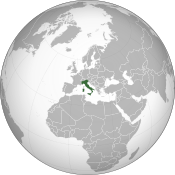Wikinews interviews Corrado Giustozzi, security consultant and author
Monday, March 17, 2008


This interview was carried out in Italian as part of Wiki@Home. It was originally added to the Italian Wikinews as Corrado Giustozzi, il Nightgaunt: sicurezza, privacy ed intelligiochi and the interview has now been translated into English.
Corrado Giustozzi, who has written many books, in addition to being an Information security consultant for many Italian law enforcement agencies, was recently interviewed for Wikinews in Italian, as part of Wiki@Home. A translation of an abridged version of the interview can be found below.
Interview
Introduction
((Wikinews )) : Hello and thanks for agreeing to take part in an interview. It seems clear from your web site that you mainly deal with information security in your occupation but you also deal with multiple themes. You have covered, science, logical and mathematical puzzles, science fiction, photography, publishing and even you have been in a film. Do you go where your heart leads you?
- Corrado Giustozzi: I certainly do! Yes, I go where my heart leads me: I always like to do new things, constantly to be put to the test, and to do things that I have never done before. I am not afraid to experiment, explore and learn. It is essentially an incurable curiousity: I feel like the Romans that did not want to die because they discovered and learned something new every day! And yes, there is an important thread that binds everything together: I always try to play in all things that I do—especially at work!
On security
((WN )) : What do you think will happen in information security in the coming months and years? There is certainly a strong acceleration in the level of awareness about these issues. But confusion seems to reign supreme. Security has become a important issue here in Italy, where popular belief is that minimal security will result in greater privacy. What do you think?
- CG: You have touched on a very important issue. Unfortunately, here in Italy and the situation is that things happen if they are required by law and at risk of heavy penalties. Even in that situation, however, people are unwilling and slow to carry out these actions. When the state is the first to ignore its own laws, it is clear that the city will derive the perception that the laws in question—and all the themes that run around them—are irrelevant or unnecessary. Privacy laws, which were created well on sensible things like issues of safety, will be ignored, because of the ridiculous extensions of the law. Many people are no longer, observing the rules...
((WN )) : What do you think it will be the next challenges in security?
- CG: I see two different scenarios depending on the size (and therefore the facility) of the organizations that must protect themselves. Small organizations should fear, above all, the intrusion of worms aimed at the creation of zombie computers used to send spam to third parties. It is a widespread threat that is growing strongly because of a lack of awareness by users and low levels of protection offered by ISPs. The medium and large companies should worry more about interior risk, which can as an example be linked to illegal or improper behaviour by its users (copyright infringement, or inappropriate use of corporate resources. (…) In any case, the problem of security is not in the technology itself but in the people that use it.
((WN )) : In Italy, cybercrime appears to have made progress. Do you think awareness of this issue has increased?
- CG: The term, cybercrime, is very broad and covers many meanings, and it is possible that this generalization should not be used. I think that, in general, the level of attention to this phenomenon has been raised a lot in recent years, which is good...
On his books and articles
((WN )) : You have published about a thousand articles in your twenty-five years of activity as a scientific journalist. Several years ago, you wrote books. You recently returned to writing after a long break. What made you return?
- CG: Murderers always return to the crime scene! Writing was my main activity for many years and it remained a great passion, even when my career turned in other directions...
On Mensa Italia
((WN )) : You are also responsible for the development and public relations of Mensa Italia, can you explain why many people consider it to be a serious organization for the upper class of society?
- CG: Firstly, I will say that Mensa is certainly not just serious, and it is not just for the upper class, as many people think. In fact, people of all types are united only by a great intellectual curiosity and the ability to take some things seriously. Between dinner and a visit to a museum or monument, we find the time to organize our internal conferences in which we invite speakers to talk about the most unusual of skills. Sometimes, I even contributed evenings devoted to some of my passions...
On Wikipedia and open source software
((WN )) : Do you know much about Wikipedia?
- CG: Beyond knowing about Wikipedia, I use it very often: as a tool for rapid documentation and to find information quickly on something...
((WN )) : Have you ever edited Wikipedia?
- CG: Very few times, I confess. I have made only a couple of dozen of edits, all of them minor. Partly because I lack the time and partly because I am not familiar with the rules and guidelines of the site.
((WN )) : What do you think about open source software? Do you use it?
- CG: I think it is good, and though I am not a fanatic, I do try to use it as much as possible.
Sources

